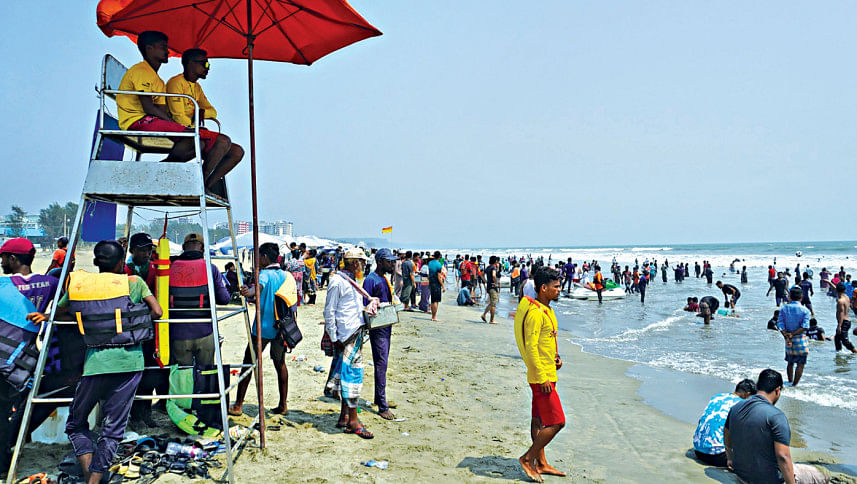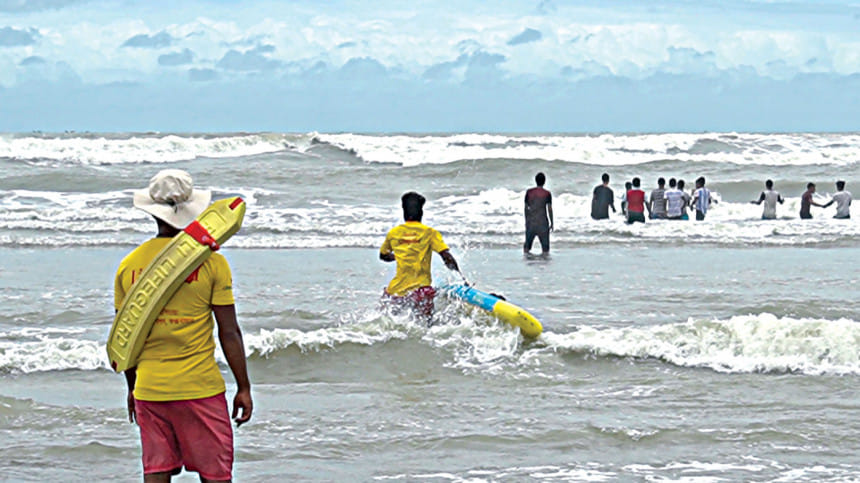Lifeguard service likely to end in Dec

Tourists who recently visited Cox's Bazar have likely seen a few young men, in yellow t-shirts and red shorts, keeping a close eye over them as they ventured out into the waters. They only have a ring buoy on their backs and constantly roam the beach or survey it from mobile watch towers, keeping visitors safe from drowning, between the morning and evening.
Even with minimal equipment, their dedication has helped them serve efficiently as lifeguards. However, soon, their operations at the sea beach will likely come to an end by this December.
SeaSafe, the largest lifeguarding project in Cox's Bazar, is run by Centre for Injury Prevention and Research Bangladesh (CIPRB) -- a non-government organisation. They are now packing up their operations, due to a lack of funding.
If their services are shut down, the lives of tourists visiting Cox's Bazar will be at stake, said individuals related to the tourism industry.
Princess Charlene of the Monaco Foundation and Royal National Lifeboat Institution provides funds for the project, said Imtiaz Ahmed, field team manager of CIPRB.

"The activities of lifeguards will halt after the tenure of the project ends on December 31, since we haven't gotten any funds yet," he added.
"After starting operations in 2014, SeaSafe lifeguards saved over 585 people. Meanwhile, 38 tourists lost their lives to the sea. If there are no lifeguards at Cox's Bazar, the death toll will surely increase," the CIPRB official said.
Moreover, 27 lifeguards are not enough to save the lives of tourists at all three beaches in Cox's Bazar, he said.
Cox's Bazar Beach Management Committee sources said lifeguard services are provided by two organisations --SeaSafe and Yasir Lifeguard, with the latter only having five lifeguards.
"SeaSafe is the main organisation providing lifeguard services here. The lives of tourists will be at risk if their service ends," said Selim Newaz, secretary of Cox's Bazar Hotel Motel, Guest House and Cottage Owners' Association.
"We have saved the lives of tourists at three beaches -- Kolatoli, Shughandha and Laboni. Our international standard rescue training has helped us greatly. If we have modern equipment, it will help save even more lives," said Rashid Ahmed, a lifeguard of the SeaSafe project.
Equipment like jet skis, lifeboats, medical emergency equipment, medical sub-centre near the beach, and modern ambulances are used to save the lives of tourists in the modern world. But they lack such equipment, said CIPRB official Imtiaz.
Contacted, Md Yamin Hossain, additional district magistrate of Cox's Bazar, said, "The lifeguard service at Cox's Bazar beach will not end after December. We are trying to manage the fund or we will arrange other alternatives to continue the service, since it's an important issue for the safety of tourists."
Moreover, they are thinking of improving their service with modern equipment, he added.

 For all latest news, follow The Daily Star's Google News channel.
For all latest news, follow The Daily Star's Google News channel. 



Comments